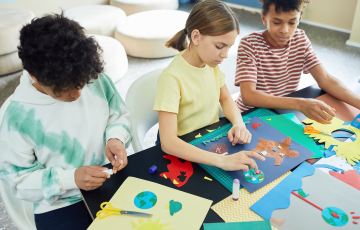Though young children can understand dangers and rules, curiosity will conquer caution.
Parents must still keep a very close eye on preschoolers. Know where they are and what they are doing at all times. Preschoolers are not old enough to ever be left alone.
Ensure safety in your home, car, and anywhere your child plays by following tips for accident and injury prevention. As your preschooler becomes more mobile and independent, you will need to begin teaching him how to keep himself safe. Re-evaluate your safety measures regularly.
Despite our best efforts to keep our children safe, accidents do happen. Take a first aid class to prepare yourself.
DID YOU KNOW?
Injuries, not illnesses, are the leading cause of death for Canadian children. Keep your child safe and prevent injury by following the suggestions listed in Car Seat Safety, Safe Home, Safe Play and Abuse Prevention.
Car Seats
A car seat can save your child’s life. Make sure you have a certified, properly installed car seat made after 1997. Older or second-hand seats may not meet safety standards and may not protect your child in an accident.
As your toddler grows, you will need to change the type of car seat she uses. The Canada Safety Council recommends:
- Rear-facing Infant Seat: Birth to 10 kg (22 lb.)
- Forward-facing Child Seat: 10 to 18 kg (22 - 40 lb.)
- Booster Seat: 18 kg (40 lb.) or over
Resources:
Car Seat Safety Basics - Canada Safety Council
Child Car Safety - Transport Canada
Choosing a child car seat or booster seat - ICBC
DID YOU KNOW?
- four out of five children are not properly buckled up when they ride in vehicles
- car accidents are the number one cause of death for children between one and nine years old
- about 75% of deaths and serious injuries that happen in car accidents would have been prevented by the correct use of a child restraint on every car trip
Safe Home
Preschoolers can walk, run, climb, open, jump, and reach their way into almost anything. Be aware of the dangers in your home, especially the dangerous places and items that might be most interesting to a curious child. Prevent accidents by limiting risks and by talking to your child about the things in your home that could hurt him.
- ensure your child’s crib or bed, car seat, stroller and all other equipment meet standards
- store all household cleaners, medications, cosmetics, vitamins and other poisons in secured cabinets out of reach of your child
- a preschooler’s reach is only limited by her imagination so it is best to make sure storage areas have child-proof latches or locks
- prevent choking by teaching your child not to put small objects in his mouth and encouraging him to sit while eating
- cut foods that are choking hazards (nuts, hot dogs) into small pieces
- never leave your preschooler unattended in the bath
- install safety gates on stairs
- keep your home smoke-free
- children exposed to cigarette smoke are at higher risk of diseases and illnesses such as asthma
- ensure toys are age-appropriate and well-made - broken toys can injure children
- the lead in old paint and PVC mini-blinds can harm your child - repaint and remove blinds from your home
- make sure safety locks are installed on your windows
- lower the temperature of your hot water heater to reduce the danger of scalding
Safe Play
Preschoolers need lots of space outdoors to run and jump and climb, and a place indoors to play games and explore. You can protect your child from injury by making her play environments as safe as possible.
- give your child play activities he can handle
- many community playgrounds have preschooler jungle gyms
- steps, slides, swings and bridges are designed for the height and abilities of smaller children
- make sure backyard pools, streams and ponds are not accessible to small children
- teach and enforce rules for behaviour around roads and in driveways and parking lots
- insist your children use protective helmets when skating or biking
- make sure your children’s toys are age-appropriate and that both toys and clothes are safe and approved by the Canadian Standards Association (CSA)
- protect your preschooler from the sun’s damaging UV rays by using protective clothing like hats and sunsuits, applying sunscreen, and limiting exposure
- keep caution reasonable
- your child needs a wide variety of physical activities to develop the motor skills, balance, strength, and agility that will help her keep their own body safe as they grows and try new things
Abuse Prevention
Sadly, many children in British Columbia are victims of abuse. As parents and as part of our larger communities, there are things we can do to protect our own children and the other children around us from abuse.
Preschoolers are old enough to begin learning the skills they need to protect themselves. Abuse prevention for preschoolers should focus on empowering children, not frightening them.
Things you can teach children to help keep them safe:
- encourage the children in your life to talk to you about their day, every day (or as often as you see them)
- teach them to tell you if an older person ever asks them to keep a secret
- make sure they know the difference between good touching (like a pat on the back or a quick hug for something done well) and bad touching, which is any touching that makes a child uncomfortable
- be sure they know it’s okay to say “no” to an older person – even if that person is someone they know and trust
- most children who are abused are victims of people they know
- as soon as they’re old enough, teach them their name, address, phone number, and parents’ names
- teach them to shout, “You’re not my mother!” or “You’re not my father!” if someone tries to take them away
- teach them to go to a sales clerk if they’re separated from you in a store
- teach them to go to a police officer if they’re in trouble and one is nearby
- never frighten your child by threatening to call the police if they do something wrong.
- give your child a code word for emergencies - that way, a stranger who doesn’t know the word won’t get far, even if they say something like, “Come with me to the hospital; your father has been hurt.”
- teach your child to say “no” firmly
- practice shouting it with them
- gve them permission to scream it if they’re in trouble
Ways adults can prevent child abuse:
- never shake a child – it’s one of the most dangerous things a parent or caregiver can do
- shaking a baby or young child can cause brain damage, blindness, and even death
- never leave a young child alone in a public place – not even for just a minute
- don’t put your child’s name on his clothing - a stranger can use it to gain their trust
- go along when a young child uses a public washroom, even if they protest
- never assume there’s someone else watching out for your child
- always know where they are and who’s looking after them
- keep an up-to-date photo (no more than six months old) with your child’s height, weight, eye and hair colour on the back, along with a description of any birth marks
(Source: Ministry of Children and Families)



